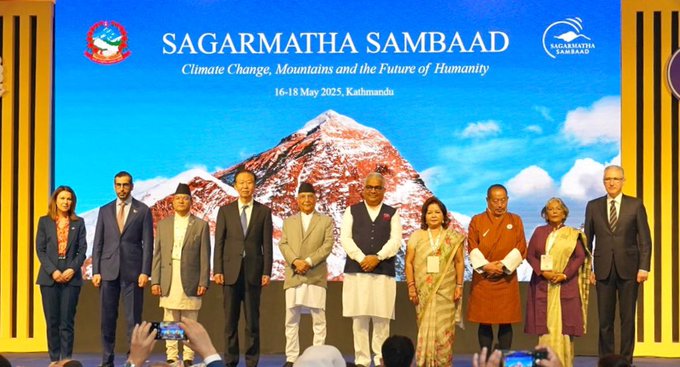Union Minister for Environment, Forest and Climate Change, Bhupender Yadav, on Friday put forth a five-point global action plan to protect fragile mountain ecosystems, while representing India at the inaugural Sagarmatha Sambaad in Kathmandu, Nepal. The high-level global dialogue, themed “Climate Change, Mountains, and the Future of Humanity”, brought together ministers, climate leaders, and policymakers from across the world.
Speaking at the summit, Yadav reaffirmed India’s commitment to global climate action and emphasized the need for collaborative efforts to safeguard the Himalayas and other mountain regions. “It is a profound honour to represent India at this historic gathering. The name Sagarmatha, meaning ‘Head of the Sky,’ aptly captures the majesty and responsibility we share in protecting our mountain ecosystems,” he said.
The Minister acknowledged Nepal’s initiative in hosting the event and highlighted the deep ecological and cultural ties India shares with its Himalayan neighbours. He pointed out that despite South Asia comprising nearly 25% of the global population, it accounts for just 4% of historical global CO₂ emissions. However, he stressed that developing countries continue to bear the brunt of the climate crisis while developed nations fall short on their climate finance and technology transfer commitments.
Underscoring the ecological richness of high-altitude regions, Yadav called for enhanced transboundary conservation and urged Himalayan nations to collaborate under the International Big Cats Alliance. This alliance, he said, can help conserve iconic species like snow leopards, tigers, and leopards by fostering shared expertise, funding, and knowledge sharing.
Referring to India’s efforts under Project Snow Leopard, Yadav cited Prime Minister Narendra Modi’s address at the 13th COP of the Convention on Migratory Species in 2020, where the significance of preserving snow leopard habitats was emphasized. He shared findings from India’s first Snow Leopard Population Assessment, conducted between 2019 and 2023, which recorded 718 snow leopards—representing 10–15% of the global population.
During his address, the Union Minister outlined a five-point call for global action:
Enhanced Scientific Cooperation – Strengthening research and monitoring of cryospheric changes, hydrology, and biodiversity.
Building Climate Resilience – Investing in adaptation measures, disaster early warning systems such as for Glacial Lake Outburst Floods (GLOFs), and climate-resilient infrastructure.
Empowering Mountain Communities – Placing local communities at the heart of policy-making and promoting green livelihoods, sustainable tourism, and the integration of traditional knowledge.
Providing Green Finance – Ensuring adequate and predictable climate finance in line with the Paris Agreement to support mountain nations in adaptation and mitigation.
Recognizing Mountain Perspectives – Ensuring that the unique vulnerabilities and contributions of mountain ecosystems are reflected in global climate negotiations and development agendas.
“India stands ready to partner with Nepal and all mountain nations to protect our shared ecological heritage. In the spirit of Vasudhaiva Kutumbakam—the world is one family—we must ensure our sacred mountains continue to stand tall as symbols of hope and sustainability,” Yadav concluded.
The event was attended by several global dignitaries, including Nepal’s Prime Minister K. P. Sharma Oli, Foreign Minister Dr. Arzu Rana Deuba, Vice Chairman of China’s National People’s Congress Xiao Jie, and COP29 President and Azerbaijan’s Ecology Minister Mukhtar Babayev.









































